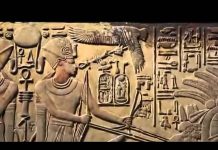In the captivating episode of “What the Ancients Did For Us – The Greeks,” we embark on a mesmerizing journey through time, uncovering the remarkable ideas and inventions that emerged from the ancient world of Greece. With reports from Cockburn in Greece and Italy, complemented by insightful demonstrations from Hart-Davis, Jopson, and expert guests, we delve into a realm where brilliance and innovation thrived.
Geometry, the language of shapes and measurements, emerged as a powerful tool that revolutionized engineering. We witness the significance of geometry in the awe-inspiring Tunnel of Eupalinos, expertly explored by Cockburn on the island of Samos. The tunnel, made possible through geometric principles, exemplifies the ingenuity of the ancient Greeks, who harnessed mathematical precision to achieve extraordinary feats of construction.
The episode also explores the captivating invention of musical scales, attributed to the legendary Pythagoras. Hart-Davies adeptly explains the process by which Pythagoras applied his discoveries to the universe, forever linking mathematics and music. This revelation sheds light on the profound impact of Pythagoras’ insights and how they continue to influence our understanding of both the scientific and artistic realms.
Among the astonishing inventions of the ancient Greeks, the water organ stands out as a marvel of ingenuity. Ctesibius of Alexandria, a brilliant mind of his time, devised this instrument that utilized compressed air. Jopson’s reconstruction of the water organ allows us to experience firsthand the harmonious melodies that emanated from this groundbreaking invention, illustrating the Greeks’ mastery of sound and engineering.
Archimedes, a name synonymous with brilliance, utilized the power of mirrors to set enemy ships ablaze in Syracuse. Jopson’s demonstration reveals the astounding process by which Archimedes harnessed the reflective power of mirrors, highlighting the resourcefulness and strategic thinking of this legendary figure.
The episode takes us deeper into the realms of innovation with the introduction of the belly bow, a mechanical weapon that surpassed the power of a standard bow. Hart-Davies witnesses the might of this ancient technology, underscoring the Greeks’ unwavering pursuit of more efficient and devastating weaponry.
Communication devices also take center stage as Jopson showcases reconstructed mechanisms that enabled the secure transmission of messages. This glimpse into ancient Greek communication techniques highlights their foresight and inventiveness, paving the way for future advancements in the field.
The episode delves into the political landscape of ancient Greece, unveiling the origins of democracy in the city of Athens, explored by Cockburn. Democracy, a concept that continues to shape the modern world, was born from the ideals and aspirations of the Greeks. The reconstruction of the Kleroterion, a device that ensured the fair and democratic selection of juries, adds depth to our understanding of the mechanisms that fostered the Greek democratic system.
Ancient Greece was not just a cradle of democracy and engineering marvels but also a hotbed of stagecraft innovation. Jopson’s exploration of the high-tech stagecraft of Heron of Alexandria reveals the groundbreaking use of automation and engineering principles in the ancient world. From the first robot to steam engines and automatic doors, Heron’s creations astound us with their complexity and foresight.
The episode takes us to the mystical realm of the Oracle at Delphi, visited by Cockburn, where ethylene inhalation preceded her prophetic visions. This glimpse into ancient Greek spiritual practices underscores their deep connection with the mystical and their quest for divine guidance.
Moreover, Hart-Davies delves into the advanced astronomical theories put forth by renowned Greek scholars like Pythagoras, Aristarchus of Samos, and Eratosthenes. These visionary thinkers challenged prevailing beliefs, paving the way for our understanding of the cosmos and inspiring future generations of astronomers.
Finally, the episode introduces us to the enigmatic Antikythera mechanism, demonstrated to Hart-Davies. This intricate device, often hailed as the world’s first computer, epitomizes the Greeks’ astonishing grasp of technology and their ability to merge scientific knowledge with practical applications.
In conclusion, “What the Ancients Did For Us – The Greeks” unveils a world of unparalleled genius and innovation. From geometry to democracy, music to weaponry, the ancient Greeks left an indelible mark on human civilization. Their inventions continue to inspire and shape the modern world, reminding us of the profound impact that the pursuit of knowledge and creativity can have on the course of history.

































